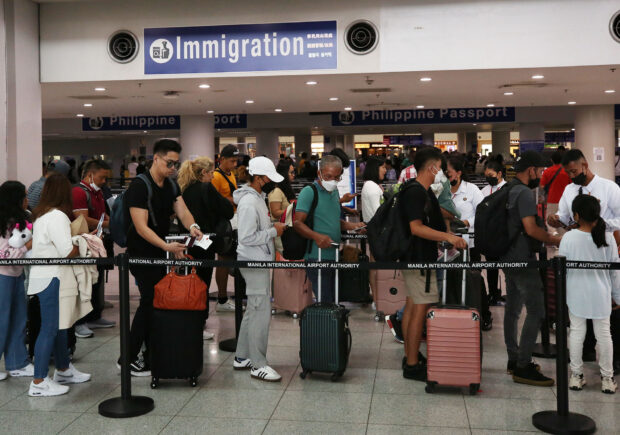Longer airport queues, delays seen with tighter travel rules

International passengers at the immigration counter of Ninoy Aquino International Airport Terminal 3 in Pasay City. Manila International Airport Administration Bryan Co said they added immigration counters in the airport so that it now has 44 counters for faster transactions.
(File photo by RICHARD A. REYES / Philippine Daily Inquirer)
MANILA, Philippines — Opposition Sen. Risa Hontiveros warned on Monday of longer queues and delays at immigration counters in the country’s international airports as the Department of Justice (DOJ) stood pat on the soundness of the new travel guidelines for outbound Filipinos that would take effect on Sept. 3.
In a statement, Hontiveros said that while she commends the Inter-Agency Council Against Trafficking (Iacat) for intensifying its efforts against human trafficking, such measures should not be implemented at the expense of travelers.
“I urge the [DOJ] to not take for granted the complaints of passengers who may be inconvenienced by these latest travel guidelines. The public’s concerns with the revised international travel guidelines should not be dismissed as mere ‘miscommunication,’” she said.
“We (in government) shouldn’t turn a blind eye to warnings that some of the requirements would only promote delays and are prone to exploitation by corrupt immigration officers,” Hontiveros added.
‘Communications failure’
The DOJ earlier apologized, saying there was a “communications failure” when it announced the new travel restrictions.
Article continues after this advertisement“We will say sorry because communication regarding the revised guidelines was not done well,” DOJ spokesperson Mico Clavano said on Friday.
Article continues after this advertisement“We understand (the public uproar), and there was really that kind of side that came out; and I think it really is a communications failure that we did not release the 2015 guidelines … side by side with the 2023 [rules],” he added.
The DOJ is the lead agency of Iacat, with Justice Secretary Jesus Crispin Remulla sitting as its chair.
Hontiveros scored the council’s supposed insistence on “dysfunctional guidelines,” which she feared could derail the government’s antitrafficking efforts.
Instead of shrugging off public criticism as stemming from a communications issue, Iacat must learn to listen to other stakeholders and their fellow policymakers, she said.
“The Iacat must take into consideration the various inputs from lawmakers, legal experts, and everyday Filipinos about the new predeparture guidelines,” she stressed.
Hontiveros reminded the council that the Senate, through its committees on public services and on women, children, family relations and gender equality, had drawn ample findings from previous inquiries that could aid it in crafting travel guidelines.
“The Iacat must study thoroughly how the government can effectively implement the new guidelines in a manner that is both effective and practical,” she said.
Travel documents
Among the issues that Iacat needs to clarify is whether all first-time travelers must present “proof of hotel booking or accommodation.”
Hontiveros also wondered how the requirement of “notarized original affidavit of support and guarantee” for sponsored travelers could be complied with without unduly burdening them.
“If these problematic requirements are not rectified, then the ‘45-second’ processing time for travelers being promised by the Bureau of Immigration will become an empty promise,” she said.
At the House of Representatives, Assistant Minority Leader Arlene Brosas, a member of the overseas workers’ affairs committee, said that the root of human trafficking should be addressed “instead of coming up with ridiculous measures that will further add insult to the suffering of our OFWs (overseas Filipino workers).”
“We are burdening them with too many bureaucratic requirements when we should be looking at strategic solutions to address joblessness and poverty, notwithstanding the record of weak prosecution of traffickers in the country,” Brosas said in a statement.